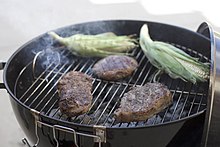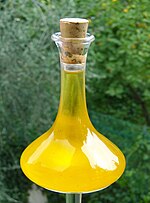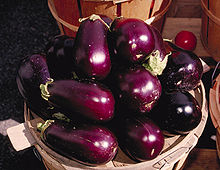Food preparation techniques
Cooking with dry heat
 KitchenAid Stand Mixer in action
KitchenAid Stand Mixer in action - Baking – the technique of prolonged cooking of food by dry heat acting by convection, normally in an oven, but can also be done in hot ashes or on hot stones. Appliances like Rotimatic also allow automatic baking.
- Blind-baking – baking pastry before adding a filling.[2]
- Barbecuing – method of cooking meat, poultry and occasionally fish with the heat and hot smoke of a fire, smoking wood, or hot coals of charcoal.
 Roasting, medieval illuminated manuscript (Tacuina sanitatis casanatensis 14th century)
Roasting, medieval illuminated manuscript (Tacuina sanitatis casanatensis 14th century)  Cooking with charcoal on a barbecue grill
Cooking with charcoal on a barbecue grill - Grilling – a form of cooking that involves dry heat applied to the surface of food, commonly from above or below. May involve a grill, a grill pan, or griddle.
- Maillard reaction – a chemical reaction that occurs when amino acids and reducing sugars are exposed to heat which gives browned food its distinctive flavor
- Roasting – cooking method that uses dry heat, whether an open flame, oven, or other heat source. Roasting usually causes caramelization or Maillard browning of the surface of the food, which is considered by some as a flavor enhancement.
- Rotisserie – meat is skewered on a spit - a long solid rod used to hold food while it is being cooked over a fire in a fireplace or over a campfire, or while being roasted in an oven.
- Smoking – the process of flavoring, cooking, or preserving food by exposing it to the smoke from burning or smoldering plant materials, most often wood. Hot smoking will cook and flavor the food, while cold smoking only flavors the food.
- Searing – technique used in grilling, baking, braising, roasting, sautéing, etc., in which the surface of the food (usually meat, poultry or fish) is cooked at high temperature so a caramelized crust forms.
Cooking with wet heat
Water and other liquids
- Basting – the continued application of a liquid marinade or sauce during dry-heat cooking, usually when roasting meat.
- Boiling – the rapid vaporization of a liquid, which occurs when a liquid is heated to its boiling point, the temperature at which the vapor pressure of the liquid is equal to the pressure exerted on the liquid by the surrounding environmental pressure.
- Blanching – cooking technique which food substance, usually a vegetable or fruit, is plunged into boiling water, removed after a brief, timed interval, and finally plunged into iced water or placed under cold running water (shocked) to halt the cooking process.
- Braising – combination cooking method using both moist and dry heat; typically the food is first seared at a high temperature and then finished in a covered pot with a variable amount of liquid, resulting in a particular flavour.
- Coddling – food is heated in water kept just below the boiling point.
- Infusion – the process of soaking plant matter, such as fruits or tea leaves, in a liquid, such as water or alcohol, so as to impart flavor into the liquid.
- Poaching – process of gently simmering food in liquid, generally milk, stock, or wine.
- Pressure cooking – cooking in a sealed vessel that does not permit air or liquids to escape below a preset pressure, which allows the liquid in the pot to rise to a higher temperature before boiling.
- Simmering – foods are cooked in hot liquids kept at or just below the boiling point of water,[3] but higher than poaching temperature.
- Steaming – boiling water continuously so it vaporizes into steam and carries heat to the food being steamed, thus cooking the food.
- Double steaming – Chinese cooking technique in which food is covered with water and put in a covered ceramic jar and the jar is then steamed for several hours.
- Steeping – saturation of a food (such as an herb) in a liquid solvent to extract a soluble ingredient into the solvent. E.g., a cup of tea is made by steeping tea leaves in a cup of hot water.
- Stewing – food is cooked in liquid and served in the resultant gravy.
- Vacuum flask cooking
Frying with oil
- Frying – cooking food in oil or another fat, a technique that originated in ancient Egypt around 2500 BC.[4]
- Deep frying – food is submerged in hot oil or fat. This is normally performed with a deep fryer or chip pan.
- Gentle frying
- Hot salt frying
- Pan frying – cooking food in a pan using a small amount of cooking oil or fat as a heat transfer agent and to keep the food from sticking.
- Pressure frying
- Sautéing
- Shallow frying
- Stir frying
Other cooking techniques
Chemical techniques
- Brining –Brining is a process similar to marination in which meat or poultry is soaked in brine before cooking
- Ceviche
- Drying
- Fermentation
- Marinating
Mechanical techniques
- Cutting
- Cutting board
- Dicing – cutting an ingredient into cubes of a consistent size.
- Grating – using a grater to shred an ingredient, for instance, vegetables or cheese.
- Julienning – the process of cutting an ingredient into very thin, long pieces, such as the thin carrots in store bought salad mix.
- Mincing – cutting an ingredient into very small pieces.
- Peeling – removing the outer skin/covering off of an ingredient, commonly a fruit or a vegetable.
- Shaving – the process of planing off thin strips of an ingredient.
- Chiffonade – cutting an ingredient into ribbons.
- Kneading
- Milling
- Mixing – incorporating several different ingredients to make something new; for instance, mixing water, sugar, and lemon juice makes lemonade.
- Blending – using a specialized machine called a blender to grind or puree ingredients together.
- Vacuum filling – a mechanized method of creating filled items, for instance, for filling pastries.
Cooking tools
Appliances
- Microwave oven – type of oven that heats foods quickly and efficiently using microwaves. However, unlike conventional ovens, a microwave oven does not brown bread or bake food. This makes microwave ovens unsuitable for cooking certain foods and unable to achieve certain culinary effects. Additional kinds of heat sources can be added into microwave ovens or microwave packaging so as to add these additional effects.
- Oven
- Stove or cooker
Utensils
History of food preparation
International cuisine
 Seafood gumbo, an example of Cajun cuisine
Seafood gumbo, an example of Cajun cuisine A sample of some cuisines around the world:
- African cuisine (see list)
- Asian cuisine (see list)
- European cuisine (see list)
- Oceanian cuisine (see list)
- Cuisine of the Americas (see list)
General ingredients
 Decorated bread loaves
Decorated bread loaves  Olive oil
Olive oil  A platter with cheese and garnishes
A platter with cheese and garnishes - Cereals –
- Cooking fats and oils
- Butter –
- Rapeseed (Canola) oil –
- Coconut oil –
- Corn oil –
- Rice bran oil –
- Flaxseed oil –
- Lard –
- Margarine –
- Olive oil –
- Palm oil –
- Peanut oil –
- Sesame oil –
- Soybean oil –
- Sunflower oil –
- Tallow –
- Dairy –
- Buttermilk –
- Cheese –
- Cream –
- Milk –
- Yogurt –
- Eggs –
- Fruits –
 Japanese silken tofu (Kinugoshi Tofu)
Japanese silken tofu (Kinugoshi Tofu) - Legumes –
- Beans –
- Lentils –
- Soy –
- Miso –
- Soy cheese –
- Soy milk –
- Soy sauce –
- Soy yogurt –
- Textured soy protein –
- Tofu –
 Lamb cutlets
Lamb cutlets  Eggplants, also called Aubergines.
Eggplants, also called Aubergines. You received this message because you are subscribed to the Google Groups "1top-oldtattoo-1" group.
To unsubscribe from this group and stop receiving emails from it, send an email to 1top-oldtattoo-1+unsubscribe@googlegroups.com.
To view this discussion on the web visit https://groups.google.com/d/msgid/1top-oldtattoo-1/CAGNPKm%3D4b7CefBifoUGttj0O849Z6xnCTDsTBDZUhjGhx8JHoA%40mail.gmail.com.

No comments:
Post a Comment